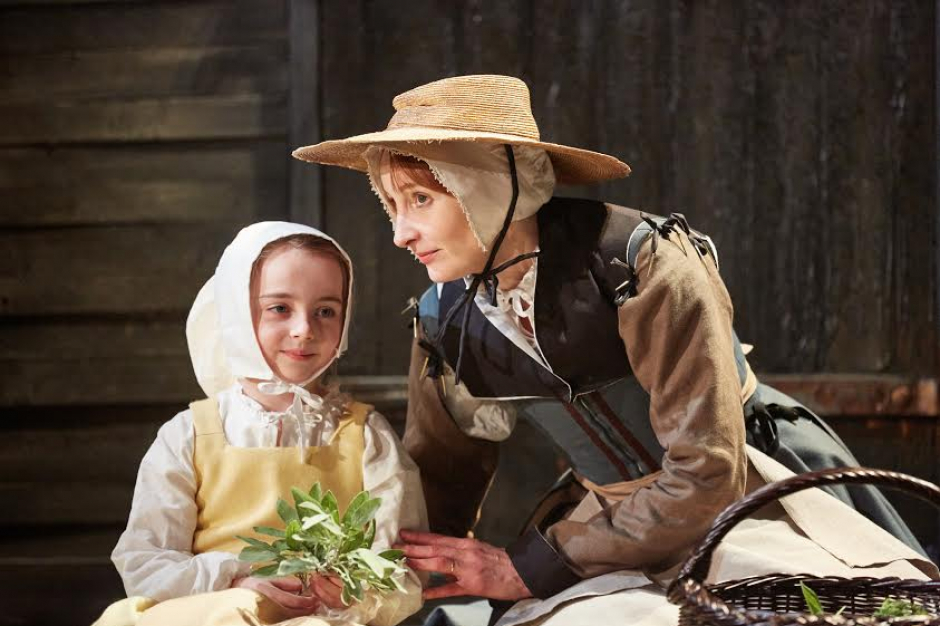The Herbal Bed, dir. James Dacre The Lowry, 30th March 2016
In the summer of 1613 Susanna Hall (Emma Lowndes), the daughter of William Shakespeare and wife of local doctor John Hall (Jonathan Guy Lewis), is publicly accused by her husband’s former student Jack Lane (Matt Whitchurch) of having an affair with close family friend and haberdasher Rafe Smith (Philip Correia). These accusations become known throughout the community and, in attempt to counter them and prove Susanna’s innocence, John convinces his wife, Rafe and the servant, Hester Fletcher (Charlotte Wakefield), to testify before the Bishop of Worcester (Patrick Driver) and his colleague Barnabus Goche (Michael Mears). A long trial ensues with Goche interrogating Susanna, Rafe, and Hester who must align their testimonies and cover the gaps in each other’s stories to convincingly refute all of the allegations made by Jack Lane. After the trial, Susanna’s father, William Shakespeare, now in his old age and no longer in good health is brought to the Halls’ house to receive medical care from John. Moments before we get to see Shakespeare, old and decrepit, the stage fades to black and the audience is left on the precipice of a reveal that the play promises but never delivers.
As with the play’s treatment of the figure of Shakespeare, this play also promises much and yet delivers disappointingly little. Initially, I was impressed by the set and costume design that, coupled with the wonderful music composed by Valgeir Sigurðsson, created an atmosphere that was immediately engrossing. This high quality of production and design was sustained throughout the play in various forms – slick, inventive transitions between scenes set outside and scenes set inside, the play of lighting at the end of the first act when Susanna and Rafe are caught declaring their love for one another that is used to signify intimacy and then exposure. The production was at its best in the second act during the trial set in Worcester Cathedral that captured the darkness and the oppressive, intimidating atmosphere of the church.
Unfortunately, the direction and performance more often than not left much to be desired. The play was performed in a midlands accent that proved to be a challenge for the actors to speak convincingly and to maintain consistently for the duration of the play. When not speaking, actors seemed at a loss for what to do, usually resorting to sitting at the side or washing the same bowl over and over again, only to return to the centre to deliver their line. Watching this play felt very much like watching actors taking turns to read a line rather than characters responding to one another in conversation.
I think that the fault for this lies perhaps not in the acting or direction but in the writing itself. The dialogue is wooden and clumsy and this means that characters do not receive proper exposition or complexity and thus are not relatable or engaging as dramatic or tragic figures. Their desires and motivations are explicated in throwaway lines of dialogue and left to be taken as fact. The sad result of this is that Susanna and Rafe’s relationship appears as if from nowhere and Jack’s double-crosses can be seen coming from a mile away. Further, the humour of Jack Lane’s character (the play’s primary source of comic relief) revolves around fast-spoken sexual innuendo that, through repetition and overuse, ends up overstepping the line between lewd, cheeky humour and overtly sexist jokes. Peharps for these reasons the most compelling moments are when none of the characters speak and small details of actors’ movements become important and noticeable: only in the moments of silence when gazes are averted, hands wrung, embraces not returned does the interaction of characters become in any way interesting or believable.
The real shame of the play is that it needn’t have been that way. Jack’s character shows his potential at the start of the second act with a gripping, long, bitter, outraged speech after having been told that his accusations had no substance in which he, having lost everything, divulges all the details of Susanna’s extramarital affairs. This moment is all too brief however and his character immediately reverts back to his former drunk, jesting self. Michael Mears as Goche steals the show in the second act with a performance that is both hilarious and intimidating, utilising physical comedy, the space of the stage, the props for comic reveals and twists, while his delivery of his lines constructs his character as a strict and harsh judge, single-handedly building the tension of the trial scene.
These moments of brilliance and the excellent production are wasted on a script that is overlong and lacks care in its character construction and plot development, a script that alludes to too much outside the play-world and elucidates too little within it.
Ruari Paton

